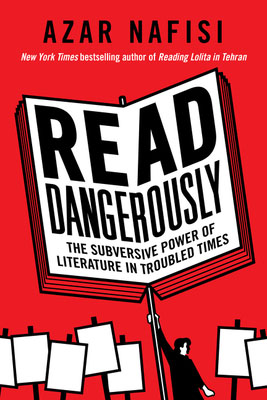[ad_1]
(guide jacket) by way of The Washington Post Syndicated Service

Copyright: Handout. E book jacket image by using The Washington Write-up Syndicated Assistance
Read Dangerously
By Azar Nafisi
Dey Avenue. 221 pp. $26.99
– – –
Azar Nafisi’s “Read Dangerously: The Subversive Power of Literature in Troubled Times” takes the variety of five letters to the author’s late father. They had been composed through the Trump presidency, as the pandemic and George Floyd’s killing unsettled both the overall body politic and unique psyches in the United States. The letters are ruminations on the position of humanistic books in places torn by conflict and polarization but they also, through flashbacks to Nafisi’s house place of Iran, attract unnerving connections amongst that totalitarian condition of her birth and the modern The us she has adopted as a naturalized U.S. citizen.
By having this method, Nafisi pays homage to two writers she gives as versions in the ebook, her sixth. James Baldwin and Ta-Nehisi Coates both of those tackled the unremitting trauma of racism in America through the literary unit of letters – Baldwin to his nephew, Coates to his son. Their warnings and their hope had been couched as choices to the following generation. Nafisi, perhaps best identified as the creator of “Reading Lolita in Tehran,” might have followed their lead and prepared to, for illustration, the two grandchildren whom she was anticipating, and who ended up born, as she wrote “Read Dangerously.” Why, rather, does she tackle her text to her father, just about two decades lifeless?
Her father was jailed by the shah’s government in 1963, when he was mayor of Tehran. His crime was to disobey orders to shut stores early and close hospitals to protesters for the duration of demonstrations in opposition to the arrest of Ayatollah Ruhollah Khomeini, then an outsider to political electric power. Khomeini experienced denounced the ruling elite’s progressive reforms, which include all those enfranchising girls. Nafisi’s father went to jail for 4 many years because he insisted on reasonable and humane treatment method for folks he disagreed with. From father to daughter, there is a clear line in the ethical and mental determination to observing the enemy’s humanity. “Read Dangerously” – criticism, memoir and argument as nicely as correspondence to a dropped liked just one – confirms that lineage.
To build her thesis (an aged just one) that studying literature will increase our ability for empathy, even and potentially specially for our enemies, Nafisi commences by placing up a traditional confrontation: amongst oppressive ability and all those who communicate truth of the matter to it by the exercise of the imagination.
Often and deftly shifting lanes amongst autobiography and literary evaluation, she makes use of her working experience and looking through of three books to question the nature of this immemorial conflict amongst the poet and the tyrant. She remembers how, as a university college student in Oklahoma, she debated Plato’s “Republic,” in which philosopher-kings exiled poets from their great modern society, with a conservative American fellow college student, a supporter of the banishment. They disagreed, but respectfully and above quite a few congenial coffees. She also remembers witnessing on the floor, as a citizen of the Islamic Republic of Iran in the 1980s, Khomeini’s infamous fatwa against Salman Rushdie for the perceived sins of his novel “The Satanic Verses.” The “poet” had published a rambunctious, large-velocity reserve about migration and the adjustments in nationwide and individual id that it catalyzes. The tyrant cleric had witnessed in it only blasphemous portrayals of the prophet Muhammad. Then Nafisi tackles another point out that bans publications and promotes burning them – the fictional, futuristic The united states that Ray Bradbury made in “Fahrenheit 451” – and she does this in a way that complicates our comprehension of who the tyrant is.
Transferring from the assumed experiment of Plato’s republic to the real-life tyranny of the ayatollah’s rule to a dystopian The united states imagined by Bradbury in 1953, Nafisi draws parallels concerning every and the America that led to the election of Donald Trump, and that nonetheless exists after his reduction of official energy. Listed here, she repeats admonitions from her prior do the job: Democracies, way too, can create totalitarian qualities and be seduced by totalitarian figures. “Whatever we connect with this determine,” she writes, “whether ‘philosopher king,’ ‘supreme chief,’ ‘führer,’ ‘father of the country,’ or ‘Mr. President,’ we are conversing about the exact point.”
Pushing beyond condition electric power, she also asks incisive questions about the intolerance in people today. Her observations implicate both equally adherents of Make The usa Excellent Again and their political foes. She sounds alarms about the alienating results of technology as effectively as ideology, conjoined twins in avoiding us from viewing the total humanity of people we disagree with. “It is uncomplicated,” she notes, “to become the carbon duplicate of the tyrant, to chat and act like him, dehumanizing your adversary.” Stopping shorter of lamenting cancel culture or wired brains, she however warns, on the edge of curmudgeonly sentiment, “When we quit looking through, we pave the way towards e book burning . . . when we like temperament to character, and fact show or digital truth to actuality by itself, then we get the type of politicians we ought to have.”
The intervention she preaches is not just to study, but to read through books that eschew ideology and in its place engage with the nuances and contradictions of personal working experience and wrestle in a profound way with knowledge the Other. She emphasizes that she’s “not speaking about literature of resistance but literature as resistance.” In addition to Baldwin and Coates, her humanistic syllabus contains other writers fully commited to empathy for “the enemy”: Margaret Atwood, Zora Neale Hurston, David Grossman, Elliot Ackerman and Elias Khoury.
What, then, does it indicate to go through dangerously? It implies to read to know the Other and to dismantle the tyrannies within just ourselves. Nafisi suggests that it also usually means to aspire beyond cultural chauvinism. She tells us that for a amazing younger lady, her former college student at a women’s university in Tehran who was later executed by the Islamic republic, studying dangerously meant slipping in love with the novels of Henry James. For Baldwin, it meant embracing Shakespeare, both equally to grapple with the remoteness and explore the intimacy of his English, as a Black writer in America who experienced inherited the language as a result of the violent displacements of the transatlantic slave trade.
In a new interview, Nafisi mentioned she initially composed “Read Dangerously” as a sequence of letters to wonderful writers but rejected the final result as stilted. Writing to her father solved the challenge. She and her father experienced, after all, exchanged numerous letters when she studied in the United States in the 1970s and when, afterwards, she immigrated below. In jail, he tackled his diaries to her, although she was just a youngster.
This ebook reciprocates the rhetorical gesture in a purely natural, personal voice. Stylistic and affective factors aside, crafting to her departed father reinforces the mood of Nafisi’s guide, which turns to the energy and illustration of the brave past and to a custom of good books as solace and information. With sensitivity and intelligence, it offers a new canon for the tyrannies of the present and the dystopian opportunities of the long run.
– – –
Gaiutra Bahadur, an associate professor of journalism at Rutgers University at Newark, is the writer of “Coolie Woman: The Odyssey of Indenture.”
[ad_2]
Source website link






More Stories
Oxford Languages
Press Room
Oxford Languages